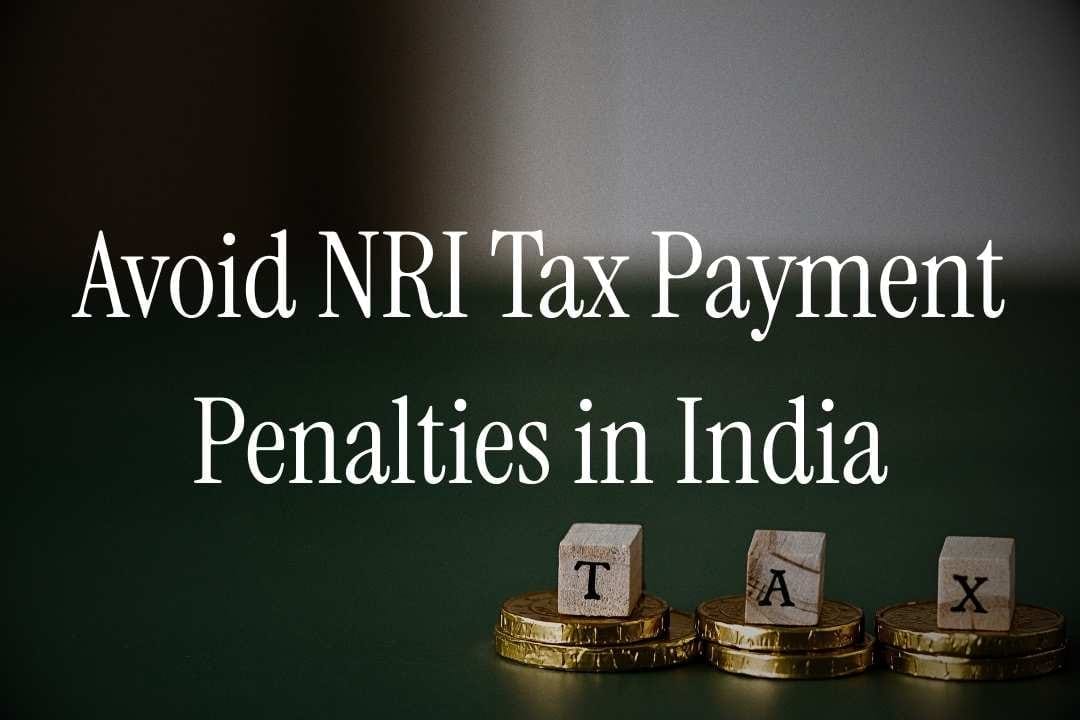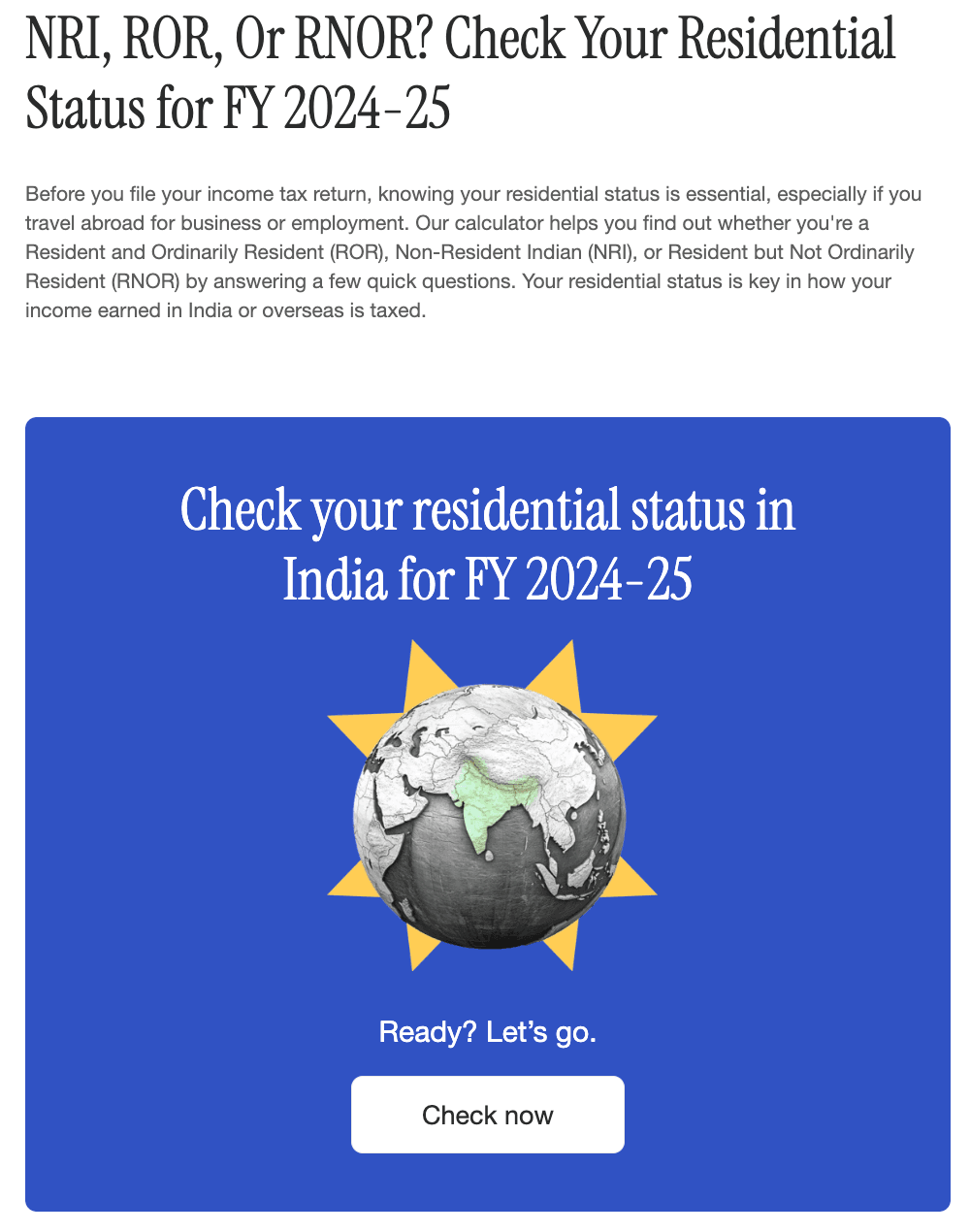
As an NRI living abroad, you will have to pay taxes on the income earned from interest, dividends, rent and capital gains etc. You need to file income tax returns for the income earned in India. Navigating your life abroad and your Indian compliances can be tricky. So, it is common for NRIs to miss deadlines related to their tax payment while living abroad.
The right information is the key to avoiding penalties and ensuring compliance. Navigating India's tax system can be tricky for Non-Resident Indians. In this blog, we’ll break down the essentials of NRI taxation, common mistakes to avoid, smart strategies to stay on the right side of the law, and practical steps to fix past errors.
Understanding Income Tax Rules For NRIs
What is Resident Status?
The resident status is the number of days a person stays in India during a financial year or over multiple financial years.
This determines whether the person has to pay taxes only on their Indian income or both their Indian and foreign income.
How to Check Resident Status?
The rules for determining resident status are defined under Section 6 of the Income Tax Act. It might get complex to understand whether you are a resident or a non-resident according to those rules.
You can check your resident status using Belong’s residential status calculator.
How NRIs Can Avoid Common Tax Filing Mistakes
1. Missing the ITR Filing Deadline
Failing to file the Income Tax Return (ITR) by the due date will result in penalties. Like resident Indians, NRIs are also required to file their ITRs (Income Tax Returns) usually by July 31st of the assessment year.
According to Section 234(a) of the IT Act, you will be charged an interest of 1% per month on the amount outstanding from your income tax dues.
For example, if you have outstanding tax of Rs. 2 lakh to pay to the department, and you pay in October of the same year. The penalty amount will be Rs. 4000 (Rs. 2000 x 2 months).
This interest rate of 1% applies to the advance tax filings under sections 234(b) and 234(c) of the IT Act.
2. Ignoring Tax Deducted at Source (TDS) Mismatches
Mismatches between the TDS reported in Form 26AS and the income reported in the ITR will lead to notices from the tax authorities.
3. Not Utilising Double Taxation Avoidance Agreement (DTAA)
Not utilising DTAA is not a penalty as such, but using the provisions of DTAA can reduce the taxation burden for NRIs.
For example, NRIs based out of the UAE and Singapore can avoid paying taxes on their mutual fund gains by using the provisions of DTAA.
Understand the NRI income tax rules in India to ensure compliance and effective financial planning.
Strategies to Avoid NRI Tax Payment Penalties
1. Timely and Accurate ITR Filing
Ensure that you file your ITR before the deadline, accurately reporting all income and deductions. If you feel that filing the tax return by yourself is complex, seek the advice of a tax professional. The deadline for filling is July 31st of the previous year. For example - for FY 2024-25 the returns filing date has been extended to 15th September 2025.
2. Regularly Review Form 26AS
Monitor your Form 26AS to ensure that all TDS entries are correctly reflected. Check and reconcile if you find any discrepancies promptly.
3. Maintain Documentation
Maintaining proper record of bank statements, interest certificates, receipts to claim exemptions or deductions, Form 16, Form 26AS, and investment proofs for capital gains will make your tax filing easier.
4. Rectifying Past Tax Filing Errors
If you have made errors in past tax filings, you can correct them using the ITR-U form. This form can be used to correct the errors from the past tax filing up to four financial years. For example- if the person has some errors in filing for FY 2024-25, they can file their revised returns from 1st April 2026 to 31st March 2030.
In addition to this, if you have received any notice from the IT department regarding discrepancies or non-compliance, address it promptly to reduce penalties.
For NRIs in the UAE, filing Indian taxes often comes with added complexity. Belong now offers an online filing service tailored to your needs - DTAA, multiple income sources, and expert CA support included.
Even if you are living abroad, filing your taxes will ensure that you are compliant in India. This will be helpful for you if you intend to settle down in India or take a loan from an Indian bank. Staying informed about your tax obligations and fulfilling compliance requirements is essential to avoid penalties. NRIs can navigate the Indian tax system effectively by understanding common mistakes, maintaining documentation and taking professional support when needed.
| Also Read:





